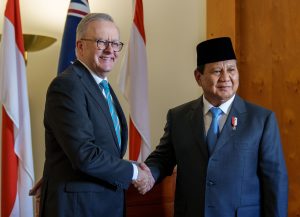This column regularly addresses the complexities of cross-border legal cases, where crimes potentially straddle two jurisdictions, causing adversity as two country’s legal systems differ in ways that make cooperation challenging.
Yet Indonesia and Australia appear to have reached a rare legal accord in the case of the Bali Nine (now the Bali Five) drug smuggling ring, with the remaining members returned to Australian shores after serving some 19 years in Indonesian prisons, having been found guilty of drug trafficking.
The Bali Nine consisted of Australian nationals Andrew Chan, Myuran Sukumaran, Scott Rush, Matthew Norman, Si-Yi Chen, Michael Czugaj, Martin Stephens, Tan Duc Thanh Nguyen, and Renae Lawrence, who were all arrested in April 2005, when four members of the group were stopped at Bali’s Ngurah Rai International Airport with over 8 kilograms of heroin taped to their bodies.
Chan and Sukumaran, labeled the “ringleaders” of the group, were executed by firing squad in 2015, while Nguyen, then serving a life sentence in prison, died of cancer in 2018.
Lawrence, the only female of the group, was given a 20-year prison term and returned to Australia in 2018 having received remission time for good behavior.
This left five members of the drug smuggling gang in various Indonesian prisons scattered across the country, all of whom were handed life sentences with no chance of parole.
Now, in 2024, the five men have been returned home, as one of Indonesian President Prabowo Subianto’s first diplomatic acts since taking office.
The new Indonesian president was sworn in on October 20, and the potential return of the Bali Five was reportedly first discussed at a meeting with Australian Prime Minister Anthony Albanese at the APEC Summit in Peru in November.
A staunch nationalist, Prabowo has long championed the rights of Indonesians abroad, particularly migrant workers on death row in countries such as Malaysia and Saudi Arabia, and has personally lobbied for years on their behalf.
In 2015, Prabowo secured the return of migrant worker Wilfrida Soik, who had been sentenced to death in Malaysia after stabbing her employer to death. Soik maintained that she had been subjected to years of abuse and torture.
With that in mind, it is practical that Prabowo would take a similar approach with foreign nationals incarcerated in Indonesia, and part of the agreement to return the Bali Five appears to be reciprocal, should Indonesia request the return of any of its prisoners from Australia.
It is also well-documented that Prabowo had reservations regarding the execution of Chan and Sukumaran.
Back in 2015, Prabowo reportedly sent a letter to then-president Joko Widodo, popularly known as Jokowi, suggesting that the execution could perhaps be indefinitely delayed.
Returning the Bali Five now also brings with it limited domestic risk for significant diplomatic reward.
There has not been any significant local backlash to the return – carefully labeled as such in official statements by both the Indonesians and Australians rather than the more problematic word “release” – and, if there were any, it could likely be easily managed.
Indonesia already faces a significant problem with prison overcrowding, and returning foreign nationals rather than burdening the Indonesian taxpayer with the costs of their prolonged incarceration is something likely to resonate with many Indonesians.
It is also a success story for foreign relations, demonstrating a willingness to compromise and a move away from the heavy-handed approach taken by the Australian government when Chan and Sukumaran were executed.
At the time, the Australian authorities, clearly becoming increasingly rattled by the prospect of the impending execution of two of its nationals – the first Australians to be executed abroad since the 1990s – spiraled into decidedly undiplomatic language aimed at Jakarta.
This included then Prime Minister Tony Abbott, who claimed that the fact that Australia had sent some 1 billion Australian dollars in aid to Indonesia after the 2004 tsunami, which killed over 200,000 people, meant that the country had the right to demand clemency for the two men.
“I would say to the Indonesian people and the Indonesian government: We in Australia are always there to help you, and we hope that you might reciprocate,” he said. “We will be making our displeasure known. We will be letting Indonesia know in absolutely unambiguous terms that we feel grievously let down.”
Predictably, the mention of money as a form of leverage was not well received in Indonesia.
“Threats are not part of diplomatic language and, from what I know, no one responds well to threats,” Arrmanatha Nasir, a spokesperson for the Indonesian foreign ministry, said at the time.
This time, however, the Indonesian administration and the Australian authorities dealt more deftly with the issue by keeping most of the details of the transfer agreement under wraps and speaking in broad terms.
“We are transferring them to their countries so they can serve their sentence there, but if the countries want to give amnesty, we respect it. It’s their right,” said Coordinating Minister for Law, Human Rights, Immigration and Correctional Institutions Yusril Ihza Mahendra.
For its part, Australia heaped praise on the Indonesian authorities, thanking them for their “goodwill” and Prabowo for his “act of compassion.”
Certainly, there is much that could have gone wrong before the return of the five men was secured, particularly as Indonesia and Australia do not have an official prisoner transfer agreement, but they were able to find the legal common ground that allowed for a best case scenario.
In the difficult legal world of cross-border cases, the return of the five men was a masterclass in foreign diplomacy and cooperation, for which both sides deserve credit.

































